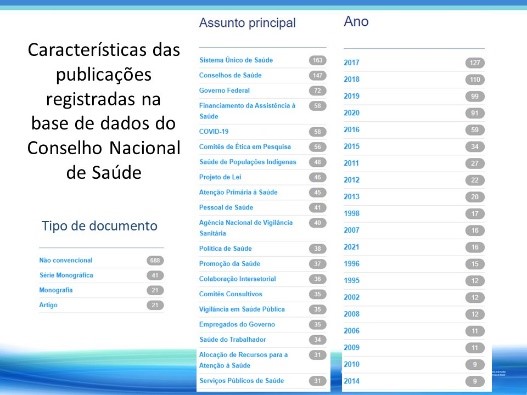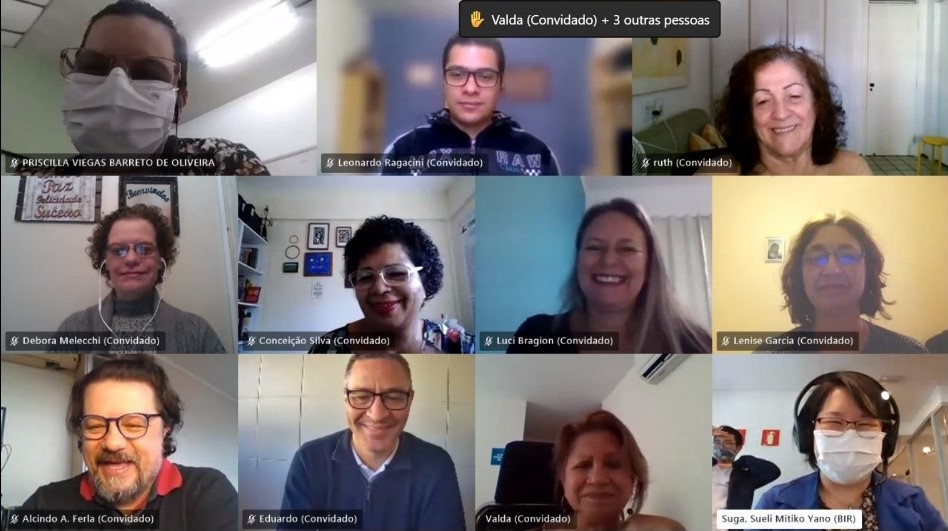The Brazilian National Health Council (Conselho Nacional de Saúde, CNS) and PAHO/WHO Brazil, through BIREME, are working on a project within the framework of the eighth Term of Adjustment to the Cooperation Term 68 (TC68/TA8), which aims to increase visibility, access, and use of technical, scientific, and dissemination publications of the CNS in Brazil and in the countries of Latin America and the Caribbean.
The details of the project were presented at a meeting with members of the Technical Chamber, who analyzed and provided feedback on the research interface, publications, and topics already registered in the CNS database, which has about 900 records of books, journal articles, reports, resolutions, recommendations, motions, agendas for meetings, and videos, and which deal with social control, the Unified Health System (SUS), the national conferences on indigenous, environmental, mental, women’s, and workers’ health, the management of the CNS and other topics.
Challenges encountered along this path were also presented, such as documentation with characteristics different from those usually covered in BIREME methodologies, standardization and registration of journals in the ISSN and preparation of journal articles for individual registration, publications that were not available for access, and different versions published on the CNS portal.
 The meeting had the active participation of members of the Technical Chamber who highlighted the importance of the project, and Priscilla Viegas Barreto de Oliveira, coordinator, representative of the CNS board, spoke of “…the happiness of participating in this type of construction [.. .] and that the CNS had a period of high content production, such as books, booklets, the bulletin of the Budget and Financing Commission and the National Research Ethics Commission, and that they are recovering the production of content”. She also highlighted that “social control produces content for practice that is used in the daily lives of people who are dedicated to the defense of public health policy in their territories […] and that this content is used as a subsidy in the debates of the spaces in which they are inserted, not only of their own entities”.
The meeting had the active participation of members of the Technical Chamber who highlighted the importance of the project, and Priscilla Viegas Barreto de Oliveira, coordinator, representative of the CNS board, spoke of “…the happiness of participating in this type of construction [.. .] and that the CNS had a period of high content production, such as books, booklets, the bulletin of the Budget and Financing Commission and the National Research Ethics Commission, and that they are recovering the production of content”. She also highlighted that “social control produces content for practice that is used in the daily lives of people who are dedicated to the defense of public health policy in their territories […] and that this content is used as a subsidy in the debates of the spaces in which they are inserted, not only of their own entities”.
Alcindo Antonio Ferla, professor at the Universidade Federal do Rio Grande do Sul and representative of United Network (Rede Unida) at the CNS, also highlighted the importance of recording grey/semi-scientific literature (reports, agendas and others), as they portray the speech of those involved in social control and give visibility to the diversity of “standpoint speech” of movements and workers articulated in health strategies”.
As expected results of this project, in addition to the indexing of CNS publications in its digital library, it will be available at the Virtual Health Library in Brazil and a collaborator of the LILACS and ColecionaSUS databases, according to its selection criteria; and that CNS directors are informed about relevant experiences and evidence on topics of interest to the Board.
Related articles
- President of the National Health Council visits BIREME https://www3.paho.org/bireme/index.php?option=com_content&view=article&id=462:presidente-do-conselho-nacional-de-saude-visita-a-bireme&Itemid=183&lang=en
- CNS and UN Center for Health Sciences plan actions to strengthen SUS in 2020 http://conselho.saude.gov.br/ultimas-noticias-cns/959-cns-e-centro-de-ciencias-da-saude-da-onu-planejam-acoes-para-fortalecer-sus-em-2020
- BIREME Cooperation in the context of the Cooperation Terms with PAHO Brazil https://boletin.bireme.org/en/2021/02/02/bireme-cooperation-in-the-context-of-the-cooperation-terms-with-paho-brazil/